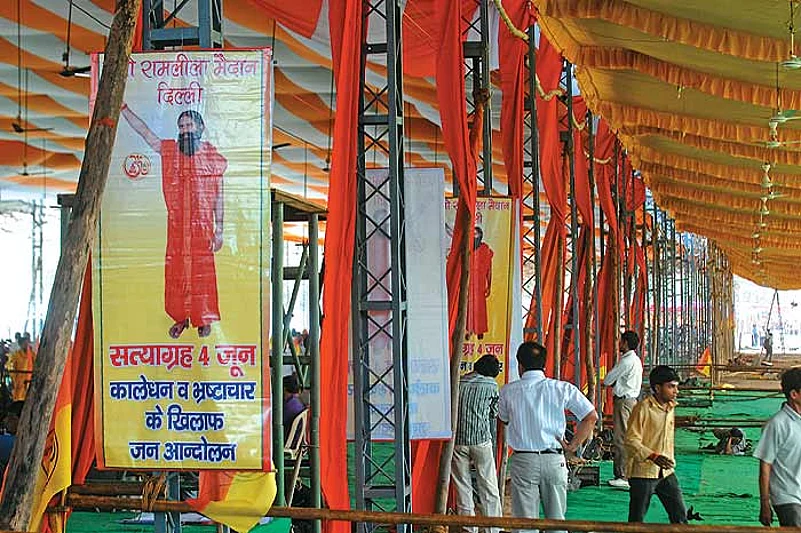At The Great Indian Kala Dhan Circus
- A 2.5-lakh sq ft waterproof and air-conditioned tent, manned by a thousand volunteers
- 1,000-odd ceiling fans and toilets; 50 LCD screens and 100 CCTV cameras
- An expected daily consumption of 5 lakh litres of water, with a borewell dug at the maidan
- 200 doctors, an air-conditioned ICU and 50 ambulances on duty
- Three communication towers and a facility centre for the media
- The anti-corruption/black money movement will be launched in 624 districts simultaneously
***
Thankfully, at least the prime minister still thinks it’s fit to wait at the airport only when American presidents come calling. Short of him, as the whole nation watched in bewilderment, the government lined up a high-profile reception committee for Baba Ramdev at the airport in New Delhi on June 1. The jet-setting guru arrived from Ujjain in a private chartered flight and immediately unleashed great turbulence in Delhi’s corridors of power. Those who had come to try and convince Ramdev to call off his June 4 fast until death against corruption included the government’s principal troubleshooter, Union finance minister Pranab Mukherjee, three of his cabinet colleagues and the cabinet secretary. (Manmohan Singh may not have been there personally but in a personal letter he had earlier issued a plea to Ramdev to annul his protest.)
So why is the government going down on its knees over Ramdev’s campaign? BJP spokesperson Prakash Javadekar believes the government is completely shaken up. “They know the wrongs they have done and the anger they have caused, whether it is the Anna Hazare-led campaign, Ramdev’s movement or the opposition campaign for a JPC.” Adds commentator Swapan Dasgupta, “It fears another middle class upsurge could also percolate down the social ladder.”
So is it because the government feels another mass uprising could threaten its prospects in the 2014 general elections? But that’s three years away, so there must be more to the story. Well, the foremost reason proffered by most is that this is the government’s way of splitting up the civil society movement by creating an alternative power centre around Ramdev. Or, even better, sabotage the Lokpal Bill by bringing him into the committee drafting it. Which must have occurred to Anna too for he tried to pre-empt any such possibility by announcing that he also would be present at Ramdev’s fast at the Ramlila maidan in Delhi. For good measure, Hazare also told reporters, “The government will betray him. Why did so many people go to meet him at the airport? They are trying to coopt him.”

Kapil Sibal and others after meeting Ramdev at IGI airport. (Photograph by Sanjay Rawat)
Given the way the government has handled Ramdev with kid gloves, some also see in it a Congress attempt to toy with soft Hindutva. Ramdev’s political ambitions are well-known and he has flirted with the idea of launching a political party. It wouldn’t hurt if the government manages to disarm him or even win him over, considering his loyal support base in the Hindi heartland. Sociologist Dipankar Gupta thinks the government is “playing both ends against the middle” by trying to outflank the Anna Hazare group while at the same time appeasing Ramdev who may be of political help. “But playing too clever-by-half isn’t a good idea. The kind of importance the government gave him at the airport, it gives people like Ramdev the impression that they can be in politics,” he says. Had they wanted to discuss matters, he adds, they could have gone to his ashram, met him privately. “Now with all that has happened, Ramdev’s got so much publicity...he couldn’t have achieved this even if he had hired a PR agent.”
All this official/public deference to Ramdev has come despite the fact that his anti-corruption credentials, at best, are questionable—there’s been allegations of land-grabbing and tax evasion, and then there’s his multi-crore ashram in Haridwar and the immensely profitable business he runs out of there. At least with the Bhushans and co, they have a past of fighting for certain social causes (they were still attacked for taking up the anti-corruption gauntlet, with opponents releasing a concocted CD to discredit their efforts). Ramdev may have real skeletons to hide, a sword that Congress general secretary Digvijay Singh, authorised by his party, has already hung over him. Not long ago, Digvijay had even asked Ramdev threateningly whether “his money wasn’t black”. Which is why many, including senior journalist Paranjoy Guha Thakurta, see some significance in Ramdev’s softening stand on the PM and the SC chief justice—the yoga guru now says the two should be out of the Lokpal’s purview.

Photograph by Sanjay Rawat
In a way, this places Ramdev in an unenviable position—if he calls off his fast, he risks angering his support base and the many right-wing ideologues who have stood by him. If he doesn’t, he runs the risk of inviting the government’s wrath. So will it just be a token strike for a day or two? RSS ideologue and Ramdev supporter K.N. Govindacharya treads softly, “The agitators have to be careful so that they are not enamoured by the government’s cajoling, diversionary and divisive tactics. Knowing him the way I do, I am sure Ramdev will go on with his fast till all the demands are met.” At the time of writing, Ramdev had cancelled his press conference on June 2 afternoon, saying he would reveal his next move on Friday. And Arvind Kejriwal, member of the Lokpal Bill drafting committee, refused to go into the “conspiracies” on why the government is supporting Ramdev, adding that he is with the guru in his campaign. “On this, we are together,” he says.
But in all this kala-dhan-wapas-lao tamasha that Ramdev has raised, are we losing the bigger anti-corruption plot? Bangalore-based National Institute of Advanced Studies professor Narendar Pani argues that if the billions of black money parked abroad is brought in, it would actually harm the economy. “With inflation already high, it would put more pressure on the rupee and make exports more expensive,” he says. It may be an economist’s view but Pani makes a larger point. “Our focus should actually be on the people behind the money, punishing them. By moving the focus away from the people to the money, we are, in a sense, letting the culprits get away.” Now, are the baba and the netas game for really thinking through things?






















